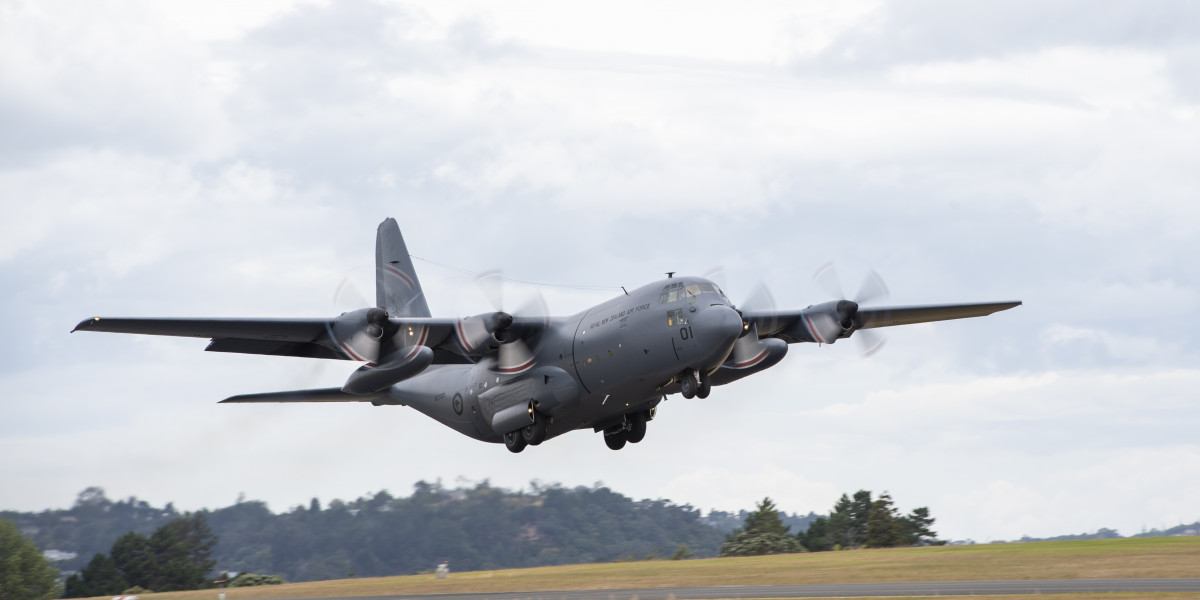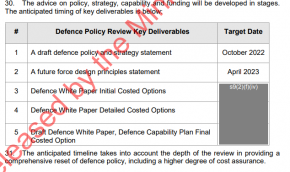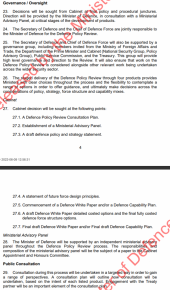Ok, the good points (from reading between the lines).
At long last we appear to be realising the potential of a fundamental shift away from the "idealism" and (lack of strategic) planning and foresight of the past 2 to 3 decades which was for a (smaller) post cold war defence force with continuously reducing capabilities (personnel, bases, equipment types) to fit the (smaller) funding envelopes to be provided by the governments of the day (eg the post cold war peace dividend which saw defence funded at around 1% of GDP for most of this period). This resulted in Defence becoming more and more "niche" to be better equipped and supported to fulfill peace-keeping and some peace-enforcement roles (for limited duration's) but at the expense of being able to better contribute to collective defence/war fighting efforts of our allies and partners (and sustain them), and also at the expense of our own "homeland" and "regional" (Pacific) security.
(The bad points would be if GOTD's then decided to reprioritise Defence within existing funding envelopes, eg around 1-1.5% of GDP or even
slightly higher than it is now - it clearly needs to be higher. And/or by further cutting some existing capabilities to provide new capabilities (but surely there is nothing more than can be cut - we've reached the "skeleton" stage as the fat then the muscle was hacked off over the last 2-3 decades? So no there is nothing further that ought to be cut, it would be incredibly foolish to do so)!
So I don't think any of those "bad points" will result because (apart from growing defence spending over time) the Defence Policy Review ToR recognises Strategic Competition (point 3.1), the effects caused by Russia's invasion of Ukraine (point 7) and presumably the heavily redacted sections that follow (denoted by "s(6)a" of the
Official Information Act refers to "
prejudice the security or defence of New Zealand or the international relations of the Government of New Zealand; or" ... presume that section also refers to certain other high profile nation(s) that has been building up its war fighting capabilities and are well known to be wanting to also invade their neighbor(s) and also gain a strategic foothold in our region etc etc.
So the DPR ToR's Scope (sections 14 and 15) sets out this fundamental shift away from previous thinking as per the following:
15. The comprehensive Defence Policy Review process will cover:
15.1. our strategic outlook;
15.2. our defence interests and policy objectives;
15.3. a strategy for delivering the agreed policy objectives;
15.4. high level design principles to shape future force development and generation to best support our policy and strategy objectives;
15.5. detailed force structure development and generation of options;
15.6. indications of funding requirements to plan, develop, operate and sustain the future force structure;
15.7. defence organisational implications in delivering revised settings, including workforce and infrastructure implications; and
15.8. dependencies between defence policy and strategy, with the wider national security sector and international partner relationships.
And the references to
future force design principles (section 20.2) and let's not forget earlier that
it suggested a policy shift from a predominantly reactive, risk management-centred approach to one based on more deliberate and proactive strategy, with explicit and prioritised policy objectives (section 4), which perfectly aligns with the recommendations of the
2021 Defence Assessment.
However I agree with those saying the timeframes are looking to be too long, but NG nails it when he notes "
but to be fair it's not something that can be hurried", I guess despite Defence knowing what needs to be done it still has to follow the bureaucratic processes in order to gain GOTD support to provide any business case funding. Sure that's the way it rolls, but it also provides uncertainty for Defence. (Sheesh, how come the Aussies (under their previous Govt) can announce many out of the blue many new initiatives i.e. post their defence assessments? Perhaps this is something else Defence can get to better understand/perhaps this is part of these DPR processes? Granted the Oz forums here explain about projects delayed or cancelled that has provided funding for new initiatives, would NZ Defence ever get those sorts of opportunities to be agile)?
But the other question is, will this also mean the Govt will further defer further DCP19 project funding until all these reviews are finished? The
Opposition is noting (also what we here have been noting) is that Labour haven't made any major investment announcements for far in this term (instead they always reference their previous term when NZFirst was their coalition partner and pushed through the Poseidon, Super Hercs and Bushmaster acquisitions etc)!
Looking at the FADTSC hearing (courtesy of Chis73's post above), the issue with DCP19 project deferrals is stated as the lack of Defence personnel that can be brought into the projects (for various reasons). If this Labour Govt wants to do one thing right it would be to direct extra funding, right now, to Defence to bring back experienced staff/SME's that may have resigned (even on short term contracts with healthy bonuses/incentives to make it worth their while) either to work directly on procurement projects and/or to go back into the services (for a period of time) to free up serving personnel to be seconded to the Projects.
Secondly and this is critical, it needs to recruit or second personnel from overseas (again with healthy bonuses/incentives) to assist with these DCP19 (and future) Acquisition Projects (the Govt is spending billions on pet projects - it has the money, easy). Eg they could be looking at the likes of the UK MoD (since they are facing massive cuts) or whomever else from elsewhere that has experience and expertise on subject matters that relate to particular DCP19 projects.
In fact the whole premise of this announcement of a Defence Policy Review is to plan for and introduce new capabilities better suited to NZ security needs, which also means future acquisition projects will increase and therefore a need for additional experienced project personnel (working for both MoD and NZDF) will become more critical, particularly if Govt needs Defence to be better prepared for the changing global and regional security situation. The Govt can do this and it needs to do this ... now!

 www.nzdf.mil.nz
www.nzdf.mil.nz




